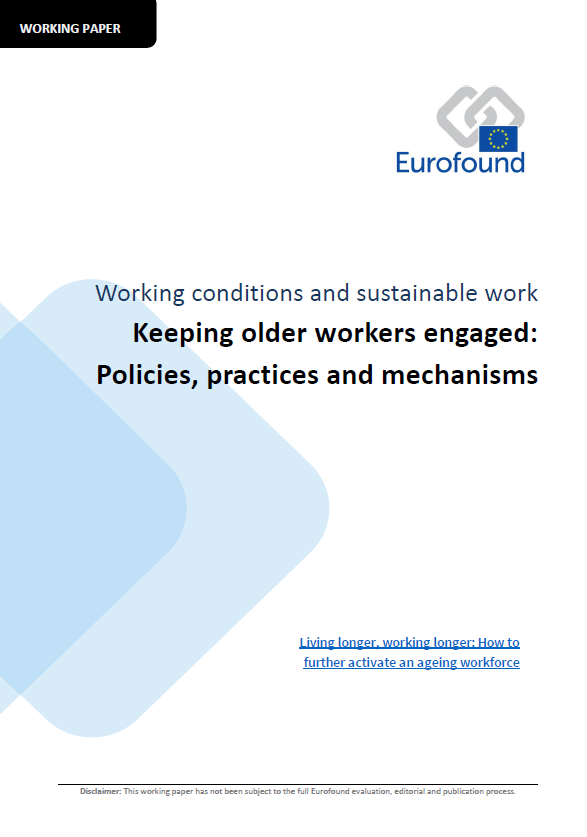EU context
Παρά τη σημαντική αύξηση των ποσοστών απασχόλησης εργαζομένων μεγαλύτερης ηλικίας την περασμένη δεκαετία σε πολλές χώρες της ΕΕ, η κοινή έκθεση της Ευρωπαϊκής Επιτροπής για την απασχόληση το 2017 επισημαίνει τις δυνατότητες περαιτέρω αύξησης των ποσοστών αυτών. Το 2016, το ποσοστό απασχόλησης των εργαζομένων ηλικίας 55-64 ετών στην ΕΕ ανερχόταν σε 55,3%, σε σύγκριση με το 66,6% για το σύνολο των εργαζομένων ηλικίας 15-64 ετών. Η αύξηση ήταν μεγαλύτερη για τις γυναίκες μεγαλύτερης ηλικίας.
Ο ευρωπαϊκός πυλώνας κοινωνικών δικαιωμάτων παρέχει ένα πλαίσιο το οποίο συνδράμει τις αγορές εργασίας να προσαρμοστούν στις νέες προκλήσεις, προάγοντας ταυτόχρονα τη δίκαιη μεταχείριση και την αλληλεγγύη μεταξύ των γενεών. Δίνει έμφαση στο δικαίωμα για ένα εργασιακό περιβάλλον προσαρμοσμένο στις επαγγελματικές ανάγκες των εργαζομένων, ώστε να τους δίνεται η δυνατότητα να παρατείνουν τη συμμετοχή τους στην αγορά εργασίας. Επιπλέον, στο πλαίσιο της πρόσφατης αυτόνομης συμφωνίας τους σχετικά με την ενεργό γήρανση και τη διαγενεακή προσέγγιση, οι ευρωπαίοι κοινωνικοί εταίροι δεσμεύτηκαν να διευκολύνουν τους εργαζομένους μεγαλύτερης ηλικίας να συμμετέχουν ενεργά και να παραμένουν για μεγαλύτερο χρονικό διάστημα στην αγορά εργασίας.
Το έργο του Eurofound
Το Eurofound έχει μακρά πείρα σε ζητήματα που αφορούν το γηράσκον εργατικό δυναμικό. Η σχετική έρευνα που διεξάγει από τη δεκαετία του 1990 εστιάζει στη συμμετοχή στην αγορά εργασίας, στην επαγγελματική απόδοση, στις συνθήκες εργασίας και στις εργασιακές προτιμήσεις των εργαζομένων μεγαλύτερης ηλικίας στο πλαίσιο της πολιτικής για το μεταβαλλόμενο δημογραφικό προφίλ της Ευρώπης. Το έργο του Eurofound έχει επίσης επικεντρωθεί στην παροχή δημόσιας στήριξης και σε πρωτοβουλίες σε επίπεδο εταιρειών για την προώθηση της απασχόλησης εργαζομένων μεγαλύτερης ηλικίας. Το Eurofound έχει εξετάσει το ζήτημα των εργαζόμενων γυναικών μεγαλύτερης ηλικίας, επισημαίνοντας τα αυξανόμενα ποσοστά απασχόλησης αυτής της ομάδα, καθώς και την αύξηση του ποσοστού τους στο εργατικό δυναμικό, ιδίως στην ηλικιακή ομάδα των 55-64 ετών.
Δεδομένα ερευνών
Οι κυριότερες έρευνες του Eurofound παρέχουν ευρύ φάσμα δεδομένων σχετικά με την κατάσταση των εργαζομένων μεγαλύτερης ηλικίας. Η έκτη Ευρωπαϊκή Έρευνα για τις Συνθήκες Εργασίας (EWCS) συγκρίνει την κατάσταση των εργαζόμενων μεγαλύτερης ηλικίας όσον αφορά τις διάφορες παραμέτρους της ποιότητας της εργασίας. Παρότι οι εργαζόμενοι μεγαλύτερης ηλικίας έχουν λιγότερες πιθανότητες να χάσουν τη δουλειά τους απ’ ό,τι οι νεότεροι, από τα στοιχεία προκύπτει ότι οι εργαζόμενοι μεγαλύτερης ηλικίας αισθάνονται ότι αν χάσουν τη δουλειά τους, δεν θα βρουν νέα θέση εργασίας με παρόμοιες αποδοχές, και μάλιστα, ότι θα τους είναι δύσκολο να επανενταχθούν στην αγορά εργασίας.
Μια μελέτη που βασίστηκε στην πέμπτη Ευρωπαϊκή Έρευνα για τις Συνθήκες Εργασίας (EWCS) εξετάζει τα χαρακτηριστικά του εργατικού δυναμικού μεγαλύτερης ηλικίας και της εργασίας σε διαφορετικές ηλικίες, καθώς και τους παράγοντες που καθιστούν την εργασία βιώσιμη για ένα γηράσκον εργατικό δυναμικό: καλές συνθήκες εργασίας, καλή σωματική και πνευματική κατάσταση, και ισορροπία μεταξύ επαγγελματικής και προσωπικής ζωής.
Η Έρευνα του Eurofound για την Ποιότητα Ζωής στην Ευρώπη (EQLS) παρέχει ευρήματα σχετικά με την ηλικία, όσον αφορά διάφορες παραμέτρους της ποιότητας ζωής στην Ευρώπη. Σύμφωνα με ανάλυση των εργασιακών προτιμήσεων μετά τα 50, η οποία βασίζεται στα ευρήματα της τρίτης EQLS, πολλοί εργαζόμενοι μεγαλύτερης ηλικίας προτιμούν να εργάζονται λιγότερες ώρες, ακόμη και αν λάβουν υπόψη τις οικονομικές τους ανάγκες. Μέσω της διευκόλυνσης αυτής της μεγαλύτερης εναρμόνισης των ωρών εργασίας με τις προτιμήσεις μπορεί να δώσει στους ανθρώπους τη δυνατότητα και το κίνητρο να εργάζονται για περισσότερο καιρό.
Μεγαλύτερος εργασιακός βίος
Πρόσφατα, το Eurofound συνεργάστηκε με άλλους τρεις οργανισμούς της ΕΕ, ώστε να εξετάσουν τη φιλική προς τους εργαζόμενους μεγαλύτερης ηλικίας εργασία στην Ευρώπη, τις προκλήσεις των πολιτικών που σχετίζονται με τη γήρανση του εργατικού δυναμικού, καθώς και καινοτόμες λύσεις.
Πολλοί εργαζόμενοι δεν είναι σε θέση ή δεν έχουν κίνητρο να εργαστούν μέχρι την εκ του νόμου προβλεπόμενη ηλικία συνταξιοδότησης. Ωστόσο, υπάρχει επίσης μια ομάδα που μπορεί και είναι πρόθυμη να εργαστεί και μετά την ηλικία αυτή. Το Eurofound έχει διερευνήσει αυτό το αυξανόμενο φαινόμενο της ανάληψης εργασίας μετά τη συνταξιοδότηση.
Οι πρόσφατες έρευνες εστιάζουν στην παράταση του εργασιακού βίου μέσω ευέλικτων συνταξιοδοτικών προγραμμάτων, εξετάζοντας συγκεκριμένα τα προγράμματα μερικής συνταξιοδότησης που μπορούν να εξασφαλίσουν αυτή τη δυνατότητα. Η ενδιάμεση αξιολόγηση της σταδιοδρομίας είναι ένας ακόμη παράγοντας που μπορεί να συμβάλει στην παράταση του εργασιακού βίου. Οι έρευνες εξετάζουν τον τρόπο με τον οποίο η αξιολόγηση αυτή μπορεί να βοηθήσει τους εργαζομένους να αποσαφηνίσουν τις επιλογές τους όσον αφορά την παραμονή τους στην εργασία και τη συνταξιοδότησή τους σε μεγαλύτερη ηλικία. Επισημαίνονται διάφορα εργαλεία που έχουν σχεδιαστεί από εταιρείες για να διατηρήσουν τους εργαζομένους μεγαλύτερης ηλικίας.
Άλλες έρευνες καταγράφουν τις εθνικές και τομεακές πρωτοβουλίες που αναλαμβάνονται από κυβερνήσεις και κοινωνικούς εταίρους για τη διατήρηση των εργαζομένων μεγαλύτερης ηλικίας στην αγορά εργασίας, συμπεριλαμβανομένων των οικονομικών κινήτρων και της βελτίωσης των συνθηκών. Σε προηγούμενο έργο, αναλύθηκαν πρωτοβουλίες διαχείρισης της ηλικίας που αναλήφθηκαν πριν και μετά την ύφεση, με σκοπό να επισημανθούν οι ορθές πρακτικές των εταιρειών στην Ευρώπη.
Πόροι
- Απεικόνιση δεδομένων: Έκτη Ευρωπαϊκή Έρευνα για τις Συνθήκες Εργασίας
- Απεικόνιση δεδομένων: Τέταρτη Έρευνα για την Ποιότητα Ζωής στην Ευρώπη
- EurWORK: Τακτικές ενημερώσεις σχετικά με τη γήρανση και την εργασία σε εθνικό επίπεδο
- Βάση δεδομένων περιπτωσιολογικών μελετών σχετικά με τη γήρανση του εργατικού δυναμικού: Παραδείγματα ορθών πρακτικών σε σχέση με ζητήματα όπως πρόσληψη προσωπικού, κατάρτιση και ανάπτυξη, ευέλικτη εργασία, υγεία, εργονομία, κ.λπ.
- Ενημερωτικά δελτία με τίτλο «Living longer, working better» (Ζήστε περισσότερο, εργαστείτε καλύτερα) από το 2011, σχετικά με τα εξής θέματα: Ηλικιωμένοι και εθελοντική εργασία, Εργασία μετά τη συνταξιοδότηση, Εργαζόμενοι μεγαλύτερης ηλικίας εν μέσω ύφεσης και Προώθηση καλών συνθηκών εργασίας
- Αντίκτυπος της ύφεσης στις πολιτικές διαχείρισης της ηλικίας - Μελέτες περιπτώσεων και εκθέσεις χωρών
























